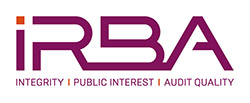Real empowerment remains an evasive ideal
| Johannesburg, Tuesday, March 14, 2017 - The Independent Regulatory Board for Auditors (IRBA) has welcomed the public hearings on transformation of the financial services sector and, given the important role that the auditing profession plays in creating a stable economy, it has made submissions in parliament to raise its concerns around the slow pace of transformation in the profession.
According to its CEO, Bernard Agulhas, transformation must move beyond numbers and begin to truly empower black accountants and black-owned auditing firms, which includes providing equal opportunities to access the audit market. Says Agulhas, “Previously, the lack of progression of young black professionals to the highest level in audit firms has been explained by the assumption that many young black accountants complete their traineeship and leave auditing for more lucrative roles in government, the corporate sector or to explore entrepreneurial opportunities. This is frequently cited as a challenge for the sector in its transformation initiatives. “The harsh reality is that of the 4 283 registered auditors in South Africa, 74.8% are white and only 10.5% are black African. We believe that, while some initiatives have been implemented, more must be done. It is not just about increasing the number of black trainee accountants; it is about giving black accountants and auditors long-term prospects in the profession equivalent to that of their counterparts. It requires a cultural shift and a more inclusive approach which will provide black accountants with a positive experience at the firms and result in higher retention. “More focus should be given to long-term career prospects, including equity partnerships and senior management and executive responsibility. Transformation is not about the de-racialisation of the overall profession; it is about financial inclusion, ownership and access to markets and opportunity.” High on the IRBA agenda is a desire to capacitate mid-tier and home-grown audit firms and build a more diverse profession with increased opportunities. Currently, exposure of black-owned firms to the auditing of JSE-listed companies is minimal, with up to 94% of the market capitalisation of the JSE being audited by the ‘Big Four’ audit firms comprising Deloitte, KPMG, EY and PriceWaterhouseCoopers. Says Agulhas: “It is critical that our black-owned firms be given access to the same opportunities. We need to see them growing in scale and capability. This cannot happen unless we create the opportunity for them to have equal access to the markets. Of the 367 JSE-accredited auditors that sign off on around 300-odd JSE-listed companies’ financial statements, as few as nine black auditors have had the opportunity to do so, according to our research.” For the regulator, as a statutory body and organ of state, and challenged like other state entities to advance government’s transformation agenda, it is about increasing diversity at the highest levels of the profession and achieving more representative participation. Only then can the economy and our financial markets operate at its maximum potential. According to Robert Zwane, IRBA Director: Education and Transformation; “The IRBA had been receiving feedback from trainees with regards to their firm experience. Trainees had been raising concerns relating to unfair discrimination in areas of performance appraisals and job allocation, and lack of cultural diversity within the firms. These concerns had and still continue to have an impact on the number of trainees being retained in the auditing profession and therefore on the numbers of trainees that may enter the IRBA’s Audit Development Programme (ADP), and eventually qualify as RAs. “Consequently, in 2015, the IRBA commissioned research amongst trainees and recently qualified CAs, to attempt to quantify the factors driving and limiting professional advancement in auditing, which could inform the board’s strategic objective for addressing diversity in the field. Says Zwane: “A largely consistent experience and set of attitudes was reported by trainees and qualified professionals alike, across the diversity of the segment. So no matter race, geography, or size of firm, the experience of trainees and recently qualified CAs was consistent with the view that race and gender transformation has been underway but that it still has room for improvement in the future. “Racial transformation is seen to be reasonable while studying with seven out of ten respondents noting equal opportunities. However, black professionals perceive less equality during traineeship and beyond.” With regard to perceptions of racial equality amongst the trainees, 90% of the African respondents felt that firms should do more to promote racial equality and 36% of the same respondents reported that they had experienced some racism from management. The IRBA will produce a detailed report and intends to explore the results in a series of workshops with audit firms before the end of this year. These will be facilitated with Audit Partners and Audit Managers respectively to attempt to reach some working resolution as to how best to balance the expectations of partners and young professionals, with a view to increasing retention of talent, and particularly advancing black talent, within the firms and the profession. “It is only when we look beyond the numbers, to initiatives that will eliminate any perceived negative experiences while creating an environment in which all young professionals are provided with opportunities to promote their retention in the firms, that we will see real transformation. Without implementing measures which will challenge and change the status quo, real empowerment will remain an evasive ideal, and we will be hard pressed to realise the goals of our Constitution,” concludes Agulhas. Ends More about the IRBA: The IRBA is a public protection statutory body established to protect the financial interests of the public by ensuring registered auditors and their firms deliver services of the highest quality. It upholds audit firm independence to ensure that audit quality is such that it enhances the accuracy and credibility of financial performance reporting. In this way, the IRBA has an important role to play in building the reputation of South Africa as an investment market for both local and global investors and driving economic growth for the country. As an internationally recognised regulator of the auditing profession and other assurance services relevant to the South African environment, it has been recognised by the World Economic Forum as the top independent audit regulator worldwide for seven consecutive years for the strength of its audit controls and standards. The IRBA also registers suitably qualified accountants as auditors, who must adhere to the highest ethics standards, and promotes the auditing profession through the effective regulation of assurance conducted in accordance with internationally recognised standards and processes.
|





